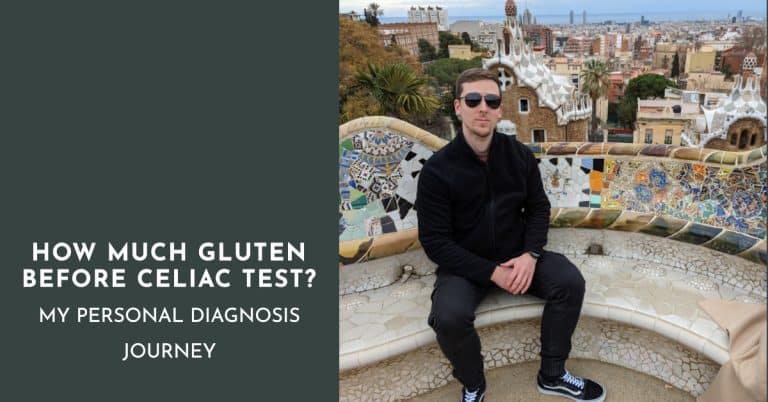Can Celiac Disease Show Up Later in Life? – A Closer Look

Picture this: you’re in your late 20s and living your best life when suddenly, your health takes a nosedive.
Digestive issues, fatigue, and other mysterious symptoms start to wreak havoc on your day-to-day. Sound familiar?
If so, you might be wondering, “can celiac disease show up later in life?”
The short answer is yes, it absolutely can – I was officially diagnosed at the age of 28, and there are instances where people much older can suddenly become celiac too.
In this article, we’ll dive into the nitty-gritty of celiac disease, its late onset, and how to navigate this new terrain. Let’s get started!
Celiac Disease: A Brief Overview
Celiac disease, in essence, is a prevalent autoimmune disorder that affects the small intestine when gluten is ingested.
It’s a chameleon of sorts, stealthily hiding among a myriad of symptoms, making the diagnosis a puzzle for many.
At its core, this tenacious condition wages war on the body’s own defenses, damaging the delicate lining responsible for nutrient absorption.
With celiac disease, a seemingly innocent protein found in wheat, barley, and rye morphs into a dietary villain, forcing those affected to embrace a gluten-free lifestyle, all in pursuit of healing and well-being.
Because celiac disease can share symptoms with other digestive issues, like IBS, getting an accurate diagnosis is crucial.
Or if you’re like me, you’ll be lucky enough to be diagnosed with both conditions!
Can Celiac Disease Develop Later in Life?
Yes, celiac disease can develop at any age, even if, in the past, you’ve tested negative [1].
However, many people with celiac disease go undiagnosed, making it essential not to cut gluten out of your diet before testing, as this can lead to inaccurate results.
Celiac disease is something to be taken seriously, as not receiving the diagnosis you need can result in health complications further down the line, including osteoporosis, infertility, and even cancer.
Why Is It Important to Get Tested for Celiac Disease?
If you suspect you might have celiac disease, it’s crucial to get tested and receive a proper diagnosis before making any dietary changes.
Removing gluten without a confirmed diagnosis can make it difficult for medical professionals to identify celiac during future tests.
So don’t make the mistake of cutting it out too early! Speak with your doctor, who can advise you on if and when you need to stop consuming gluten.
Navigating a Gluten-Free Life After Late-Onset Celiac Diagnosis
Adopting a gluten-free diet later in life can be challenging, but with the right tools and support, celiac disease doesn’t have to take control of your life.
Here are some tips to help you through the transition:
- Consult a registered dietitian: After receiving a celiac diagnosis, it’s essential to meet with a registered dietitian knowledgeable about the condition. They can help you develop a personalized meal plan and teach you how to identify gluten-free foods.
- Educate yourself: Learn about what gluten does to your gut and which foods contain it. This will help you make informed decisions about your diet and avoid potential triggers.
- Stock up on gluten-free essentials: Fill your pantry with gluten-free alternatives, such as rice, quinoa, and potatoes. This will make it easier to stick to your new diet and prevent accidental gluten consumption.
- Be cautious when dining out: Eating at restaurants can be tricky for those with celiac disease. Make sure to inform your server about your dietary restrictions and ask questions about menu items to ensure they’re gluten-free.
- Seek support: Living with celiac disease can be tough, especially when you’re dealing with late-onset symptoms. Reach out to friends, family, or online support groups to share your experiences and learn from others who are going through the same journey.
Are There Other Treatment Options Available for Celiac Disease?
Currently, the only treatment for celiac disease is a strict gluten-free diet.
However, clinical trials are in progress to develop different treatments that could make gluten less harmful for people with the condition.
Concluding Thoughts – Can Celiac Disease Show Up Later in Life?
Being diagnosed with celiac disease at the age of 28 was undoubtedly a life-changing experience for me.
I had always assumed that it was something that only affected people from birth, but I soon learned that it could strike at any age.
Fortunately, embracing a gluten-free lifestyle has been crucial in managing the condition and avoiding any harmful long-term effects.
So if you’ve spotted any of the warning signs, including an unexpected change in bowel habits, it’s well worth exploring the possibility you could be celiac too!
FAQs: Answering Your Burning Questions
Can celiac disease symptoms come and go?
Celiac disease symptoms can come and go, which can make it difficult to pinpoint the cause of your symptoms. However, once you’re on a gluten-free diet, your symptoms should improve, and any accidental gluten exposure can cause them to return.
Can gluten cause other health issues?
Yes, gluten can cause a variety of health issues for those with celiac disease, including sinus congestion, joint pain, anxiety, and headaches. If you’re experiencing these issues regularly, it’s well worth consulting with your doctor.
Can you outgrow celiac disease?
No, you cannot outgrow celiac disease. Once you’re diagnosed with the condition, you’ll need to maintain a gluten-free diet for the rest of your life to prevent symptoms and complications.
Can a celiac tolerate small amounts of gluten?
No, even small amounts of gluten can cause harm to someone with celiac disease. It’s essential to adhere to a strict gluten-free diet to avoid damage to your small intestine and other health complications.
Disclaimer: This content is based on my personal experience as an individual diagnosed with celiac disease and IBS (Irritable Bowel Syndrome) who follows a strict gluten-free diet. This does not constitute medical advice. Please consult a medical professional, nutritionist, or qualified dietitian for personalized, professional advice.


